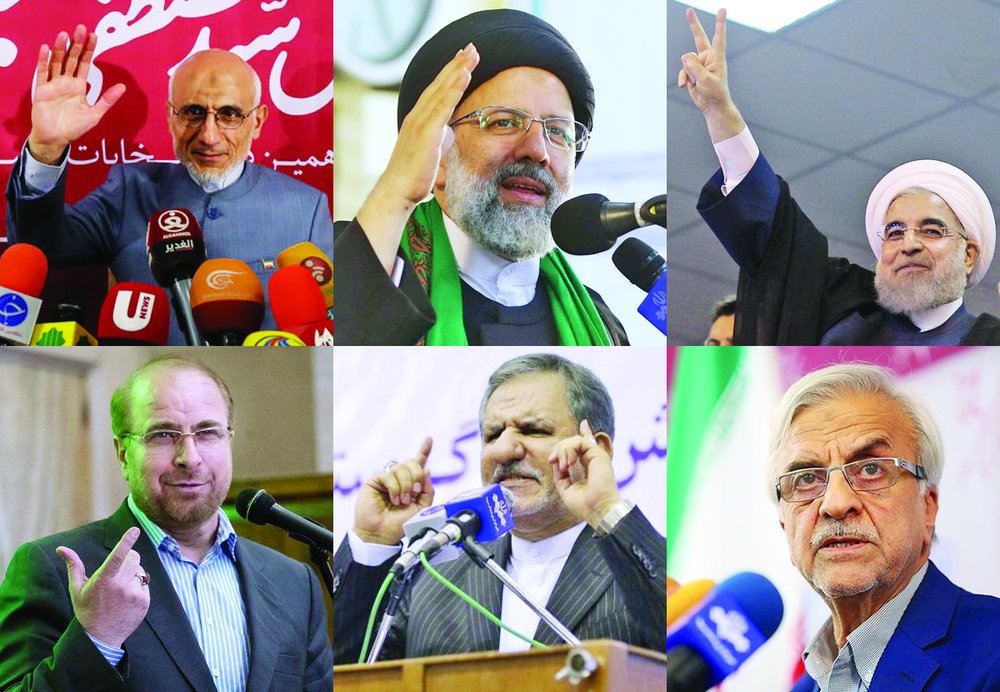A background to the May 19 presidential election

TEHRAN – The fate of Iran’s May 19 presidential election has been hotly debated both inside and outside of the country over the past few months. And now, within three days it will be clear who will be sworn in in August as the 12th president since the 1979 Islamic Revolution.
The election is arguably one of the most sensitive, definitive snapshots in Iran’s contemporary history.
By almost every measure, the country is domestically faring well once pitted against previous administrations. Tehran’s economy has rebounded much faster than many economists anticipated when nuclear-related sanctions were removed at the wake of the 2015 international nuclear deal.
It has improved from a negative growth of 6 percent in 2013 to 7 percent growth in 2016. The largest driver has been Iran’s ability to sell its oil and petrochemicals back on the international market.
Other economic indicators are growingly brilliant. Inflation has been tamed. Unofficially it was hovering around 40 percent in 2013 but has now declined to about 8 percent, a first in decades. Also, international investors are flocking to the country; currency fluctuations are stabilized; tourist arrivals are unprecedented, and economic mismanagement has to a large extent been rectified.
Regionally, the Friday election happens in the context of the Middle East's protracted conflicts which have caused a region-wide threat; relations between Iran and the Arab world, led by archrival, bellicose Saudi Arabia, have fallen to a low point in decades; certain regional countries are finalizing biggest arms deals ever clinched with Western allies; and the Syrian peace talks have reached a vital stage.
Internationally, it is the first presidential campaign since the nuclear accord; Iran and the European Union are reveling in close, strong consultation over a spectrum of issues; Tehran’s ties with Russian and China are upgraded to critical levels; and it comes just months following the inauguration of the populist, erratic Trump administration.
It is against this background that the nation’s vote becomes so meaningful. Months before presidential hopefuls began registering in April, controversial former President Mahmoud Ahmadinejad, who was on the wane since 2013, was preparing himself to stand as candidate in the election.
This is while Supreme Leader Ayatollah Ali Khamenei already revealed that he had recommended Ahmadinejad not to enter the contest.
Defying the warning, however, Ahmadinejad surprised all as he and his younger protégé Hamid Baghaie registered for the race, saying that the Leader’s recommendation was "just advice”.
The registration was seen by many as the first major blow to the principlist front who no longer backed Ahmadinejad for what they called his deviation from the “revolution’s path”.
The principlists, however, sought to agree on a different mechanism to come up with a shortlist of potential candidates who can win the nation’s confidence.
To achieve the goal, the Popular Front of Islamic Revolution Forces, aka JAMNA, took the initiative to name five, including Ebrahim Raisi and Baqer Qalibaf. Despite efforts to persuade Raisi and Qalibaf into a coalition, both filled the paperwork for the election.
On the other hand, Mostafa Mirsalim, another principlist who was not invited by JAMNA, registered independently, another blow to the principlist camp. On the other hand, moderate incumbent President Hassan Rouhani and his reformist vice president Is’haq Jahangiri registered for the race. Also, Mostafa Heshemi Taba, entered the race independently.
Election campaigns entered a more serious phase as live presidential debates began. Three rounds of live debates were an opportunity for the presidential hopefuls to haggle over key issues such as economy, culture, the environment and foreign policy.
In the debates, the six candidates virtually bifurcated into two opposing poles: principlist vs. reformist/moderate. Raisi, Qalibaf and Mirsalim opposed economic performance of the Rouhani administration, accusing the government of ignoring the rights of the unprivileged.
Qalibaf and Raisi, unlike Mirsalim, also pledged to triple cash handouts to reach out to the poor, a promise criticized by Parliament speaker Ali Larijani as “impossible”.
Another key running theme of the principlist discourse in the debates was what they call a “revolutionary” approach to addressing main challenges the country faces. However, they did not make it clear how the revolutionary approach would play out in practice.
Additionally, Qalibaf branded the Rouhani administration as “the government of aristocrats” and “the government of four percentagers”.
On the other hand, Rouhani, Jahangiri and Hashemi Taba fought back, launching a strong defense of the country’s economic performance over the past four years.
The nuclear accord, unprecedented foreign investment, increase in oil and gas output, positive economic growth, self-sufficiency in wheat production, positive trade balance, record job creation, smuggling control, banking reforms, and efforts to revive Lake Urmia were a few of the achievements Rouhani, Jahangiri and Hashemi Taba bragged about.
They also chastised the principlist hopefuls for being inexperienced and having no comprehensive plan to address the country’s ails, calling them “populist”.
Electoral rivalry gathered further momentum immediately after the last debate when Qalibaf and Jahangiri dropped out to solidify support for Raisi and Rouhani, respectively.
Yet, Mirsalim and Hashemi Taba chose not to quit though they do not stand a big chance.
A candidate must win at least half plus one of the votes cast out of an electorate of 55 million.
Who will be the winner will be decided on Friday.
AK/PA
Leave a Comment